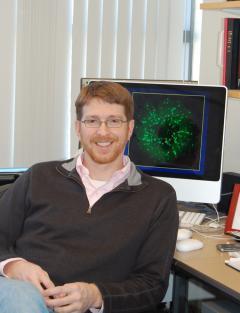-
About
- Departments & Offices
-
Academics
- Public Health
- Biomedical Sciences
- Physician Assistant
- Special Master’s (MBS)
-
Admissions & Financial Aid
- Tuition & Fees
-
Student Experience
-
- Student Resources by Program
- Academic & Student Support
- Wellness & Wellbeing
- Student Life
- Events & Traditions
-
-
Research
- Research Labs & Centers
- Tufts University-Tufts Medicine Research Enterprise
-
Local & Global Engagement
- Pathway & Enrichment Programs
- Global Health Programs
- Community Engagement

Stephen Bunnell
(617) 636-2174
136 Harrison Avenue

Research/Areas of Interest
We are interested in the signaling complexes that control T cell differentiation and activation. Using advanced imaging techniques we examine the assembly and localization of these complexes in living T cells. The composition of these structures varies dynamically in a fashion that reflects the physiological constraints on T cell activation. We have shown that these structures cannot persist in the absence of any of several critical proteins. These proteins are therefore likely to form a cooperatively assembled core complex upon which complete signaling complexes are built. Finally, we have found that these complexes change in localization over time. We are currently defining the components of the core complex and are testing how changes in localization affect the generation of signals uniquely required for T cell activation.
Education
- Doctor of Philosophy, Harvard University, USA, 1998
- Bachelor of Arts, Cornell University, USA, 1990
Biography
The dynamic regulation of cellular signaling pathways by surface receptors captured my interest early in graduate school and has sustained my interest ever since. Over the intervening years I have gained extensive experience in the biochemistry and cell biology of lymphocyte activation, and have maintained an interest in tyrosine kinase-dependent signaling pathways. During my postdoc I played a major role in bringing newly developed fluorescent protein technologies to bear on the receptor proximal events in T cell activation. The interests and methodologies established during my postdoc have remained central to my ongoing work at Tufts. In particular, my group pairs imaging technologies with biochemical approaches, rigorous structure-function analyses, and varied functional outputs to understand the mechanisms of antigen receptor signaling via the 'microclusters' induced by these receptors. I am especially interested in the signaling pathways and cytoskeletal systems that control T cell adhesion, activation, and effector function. Newer projects explore the formation of associated polyubiquitin scaffolds, the nucleation of immunologically active polymers, and the coordination of vesicle transportin response to TCR ligation. In addition, my laboratory is collaborating with other groups at Tufts to bring our expertise to bear on signaling pathways initiated by ITAM-coupled innate immune receptors (e.g.Dectin-1, Dectin-2, and Mincle) in dendritic cells and neutrophils. Our long-term goal is to understand how microcluster composition can be altered in order to specify particular pro-inflammatory or regulatory behaviors, and is therefore relevant to immunodeficiency, autoimmunity, and the rapidly advancing field of immunotherapy